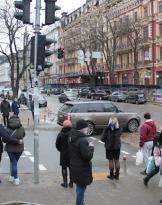Soap has been made in Aleppo for 2000 years, mixing olive oil and bay leaves. Olives and laurel have always grown in Syria. Especially towards the Mediterranean up to Alexandretta, today Iskenderun, a French gift to Turkey. Although soap has not been made for five years, they still grow today among oleanders and bougainvillea, with the sweet air that comes from the sea.
History here is at home. The 5000 years of Aleppo say, for friends Halab, perhaps the oldest inhabited city in the world.
The Citadel, the souk, the great mosque, the Christian quarter… Aleppo was beautiful. It was the city of hammams. Everyone knew the Yalbougha al-Nasri, beneath the Citadel. Since August 2014 it is half destroyed, as well as the souk and what was around it.
Capital of the north, Damascus alter ego, hot in summer, cold and humid in winter: Aleppo was the Milan of Syria.
Hell has passed in Aleppo but life has remained. Few have been there but many talk about it. Thus, without having seen. The bulk of the city has remained as it was, badly chipped by a war that got out of hand to those who thought it. The destruction is concentrated in the old part, where among the skeletons of the buildings the echo of Arab voices contends the void with metal sheets, burnt cars, rubble. Where the war passes, the stench remains. Of garbage, gas, sewer.
Our TVs tell what they want. For most, what they say is always good, even if the stench of war does not pass from the screen. Nobody knows, nobody asks, few understand. Almost all of the reports from Syria are shot elsewhere. After all, the situation on the ground interests few. Suffice it to say that Aleppo is all destroyed, even if it is not true. It is enough to coax the low-cost sense of pity that languishes within each of us. Just say something. 
In the suburbs the terrorists are still shooting. Al Nusra and the shreds of the FSA have been in trouble for some weeks. Since 2014, things have changed and the hour of the final bill is in the air. The army is coming for the battle that will perhaps change the history of the Syrian war. Many lies will come out about Aleppo, about Syria, about everything.
Here the traffic will return, the horns and the casino of a city more awake than the sly air it shows. We will return to drink coffee near the citadel and smoke. We will return to live among Ottoman balconies and streets too close to Turkey not to hear the memory.
A government office is closed and dusty from the war. A Syrian flag is seen on the destroyed sign. It looks like the Iraqi one. Syria and Iraq until the mid-80s were friend-enemy. United and divided by the ruling Baath party, Damascus and Baghdad were at the antipodes for sectarian references and related alliances. The Assad dynasty, an Alawite Shiite, looked to Iran; Saddam's Sunni regime of Khomeini's Iran was the greatest enemy. Yet both countries had ideological antagonism to warrior America (more than the West) in their DNA: a good military capacity maintained by the Soviets, a genetic opposition to Israel and a wink to the pan-Arabism of which after the " betrayal ”of Egypt at Camp David felt they were heirs. Syria and Iraq were dodgy and real fortresses. Today they look at what's left of them.
Meanwhile, the US coalition incursions that two years ago were designed for Assad are continuing with no imminent outcome.
 To see it like this, the Middle East workshop would even seem creative: Damascus, Hezbollah and Iran on paper fight the same enemy as Israel and the USA ... All this while Israel teases Hezbollah on the borders between Syria and Lebanon and Assad thanks mother Russia.
To see it like this, the Middle East workshop would even seem creative: Damascus, Hezbollah and Iran on paper fight the same enemy as Israel and the USA ... All this while Israel teases Hezbollah on the borders between Syria and Lebanon and Assad thanks mother Russia.
In 2013, Moscow averted the American bombing of Damascus by acting quietly, behind the scenes. That move spared Assad and the subsequent Iraqi-style institutional vacuum, averting further Middle Eastern geopolitical disaster.
After war upon war, pain upon pain, palaces and splintered consciences, politics is speaking again. Since 2013 the cards have changed but just as Aleppo is waiting for something, everything remains suspended. The war continues, everything accelerates but as often happens in the Middle East, the stalemate looms because it ends up looking like the only possible way.
There is talk of dividing Syria, there is talk of an end to the horror, often just talking. Those who have destabilized Syria assume their responsibilities, one might say. But even no. The word Syria runs on the web, in the corridors of diplomacy, behind the windows of the UN buildings. Israel, who is afraid of losing a dear old enemy, whom in the end it could even trust, speaks in a low voice. Washington talks about it, worried about covering up the follies of the last 15 years. Moscow speaks of it, re-entering the great game of the Near East. The man on the street talks about it, more ready to share and be indignant than to understand.
What matters is that Aleppo has continued to live in the meantime. Of the old Milan of Syria, a Unesco heritage site, only the old city is reduced to ashes. The ash will perhaps serve to start over, perhaps from the soap itself. That soap that will have to wash away horrors, grief and endless lies. One day maybe they will start producing it again with olive oil and laurel, relying on the distant west wind that brings sea air and sometimes even common sense.
(Photo: DO)












